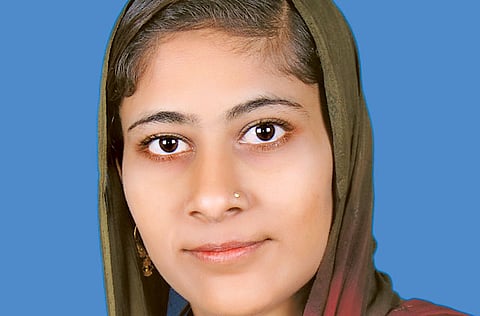Teen appointed youngest village head in Gujarat
Afsana Badi is the youngest village head in India and is confident of making a difference

New Delhi: At 18, Afsana Badi, a Muslim girl from Kankot village in Gujarat, has become the youngest sarpanch (village head) in the country. The village is 12km away from the erstwhile princely state of Wankaner, in Rajkot district.
A first-time voter, Afsana studied until class 10, after which she had to drop out of school as there were no facilities for further education in or around her village. Not one to lose heart, she broke stereotypes and, unlike girls of her age who opted to get married, shaped her dreams and made herself comfortable amidst men and women more experienced than her.
Her win did not come as a surprise to her former classmates, who knew Afsana was made of sterner stuff and would some day do them proud. She is now working towards better education facilities for girls and because she has authority in her hands, many of her batchmates go to Afsana to get their documents signed. When not on official duties, Afsana loves to cook and help her mother in other domestic work. The young and vivacious sarpanch often also heads to her farm on her father’s motorbike to supervise work.
She speaks to Gulf News in an exclusive interview.
GULF NEWS: What led you to contest the elections for the village head?
AFSANA BADI: Honestly, the decision to contest the election was not mine. My father felt that instead of sitting at home I should be doing something constructive with my life. Though initially I was not very enthusiastic, on winning the election I realised the responsibility entrusted upon me was immense. Of course, it also feels good to know that I am perhaps the youngest village head in the country.
Was it not difficult for people to accept a young girl as the village head?
I do not think such things matter in villages these days as long as the person proves herself and does her duties with sincerity. People may be conservative, but development is always foremost in everyone’s mind. And they do not hesitate to approach me with their problems.
Don’t you think you should have studied further rather than hurrying up and taking the responsibilities of the villagers?
I left studying after Class 9 and have been at home for the last 3-4 years. Our village had a school only till Class 7 and to study further I had to travel five kilometres away from my village. Even today Kankot does not have a high school. I am not treating all this as a disadvantage and am trying to improve the education system in the village.
What work have you undertaken to improve education facilities for the girls of your village?
It was a pleasant surprise when my alma mater invited and honoured me after I won the election. And the first thing I did was to get approval for additional classrooms for the school and pledged to build a high school in my village. The foundation stone of the high school was laid recently.
Do you intend to study further?
My brother Gulam, who is my mentor and guide, often advises me to study further. But I would find it embarrassing to sit in a class with girls much junior to me and made him see my point of view. Now he supports me and I have set my priorities. My aim is to create awareness among the villagers and make them self-dependent. I also want to educate young girls and women about their rights and responsibilities. Though it is too early to say anything, I am very hopeful of getting support from the womenfolk and am trying to develop a good rapport with them.
What other major works you intend carrying out in the interest of the villagers?
The main issue in our village, which falls under one of the most backward districts of Gujarat, includes increasing the height of the road that passes through the village, as the area becomes inaccessible in monsoon due to river water. My focus is also on the provision of safe drinking water. Apart from working towards these, I want the villagers not to sit back, but take up the responsibilities and realise that we can develop rural areas to prevent the youth of the village from migrating to urban areas.
Generally, what particular issues do people approach you with?
The villagers are dependent on agriculture for a livelihood and they wait for the monsoons. As a sarpanch my duty is to see that life is made easier for them. We are discussing rainwater-harvesting facilities. We can build reservoirs to conserve rainwater to prevent it from flowing out of the village.
How supportive are your parents towards your ambitions?
I get total support from them and they understand the problems of the village well. Earlier, my mother was the sarpanch of Kankot followed by my father. Prior to them, my great granduncle served the villagers for 15 years. Working in the interests of the villagers has been a tradition followed in the family. In fact, my father accompanies me to the village panchayat meetings. He has trained me to write letters to MPs and MLAs for different grants. He has also taught me to understand people’s situation when they visit us at odd hours for our signatures on documents or with their other sundry problems.
Exposed to politics from childhood, do you have ambitions to become an MLA or an MP in the near future?
I want to take things in my stride and not become over-ambitious. Presently, we are struggling and working towards fulfilling the needs of people at the village level. And thinking of the state level would mean aiming for too much too soon.
Sign up for the Daily Briefing
Get the latest news and updates straight to your inbox


